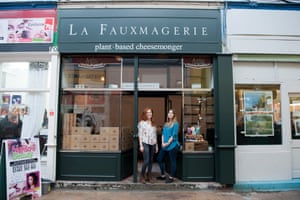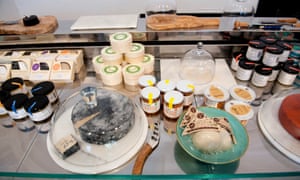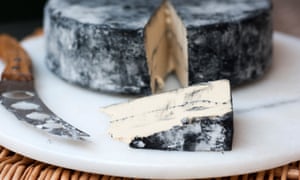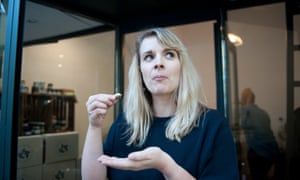https://www.theguardian.com/lifeandstyle/2019/feb/20/to-brie-or-not-to-brie-can-vegan-cheese-taste-as-good-as-dairy?CMP=fb_gu&fbclid=IwAR2kxJJP19OivrRLfyDpyDYlM0S-gs7jlBXIpQD6PyhhCQZKzIgbLGz4hX4
To brie or not to brie: can vegan 'cheese' taste as good as dairy?
Britain’s first ‘plant-based cheesemonger’ has outraged the traditional food industry. But can something made from nuts and coconut oil ever rival cheddar or camembert?
Dairy is torture for animals, disastrous for the environment and only questionably vital for good health – but the arguments increasingly piling up in favour of veganism are, for many, still amply dismissed by one straight from the heart: “I could never give up cheese.” The cheese on toast of childhood, bronzed at the edges and bubbling with Worcestershire sauce; the midweek pick-me-up of macaroni cheese; the cheeseboard lending a genteel veneer to late-night gossiping: for those who can stomach it, cheese is among the most potent and dependable of life’s little pleasures.
Though I once lived happily as a vegetarian, just the thought of even a Babybel (which I eat daily) silences the voice in my head nagging me to at least think about going vegan, starting next week, maybe. An ethical, sustainable alternative to cheese could be the vegan lobby’s coup de grâce.
Charlotte and Rachel Stevens tell me it’s already here – here being Brixton village in south London. The sisters opened La Fauxmagerie, the UK’s first and only “plant-based cheesemonger”, two weeks ago – and, both weeks, they have completely sold out.
“There have been queues out of the door – we can’t keep up,” says Charlotte, 30, at the shop on Tuesday afternoon. When I arrive, she and Rachel are furiously replenishing their shelves with their latest, larger delivery, and have just wrapped up a job interview for a part-timer to help them go from five days’ opening to seven. Even though they are closed, we are interrupted by 10 potential customers in just over an hour.
The response has by far exceeded their expectations, which was to earn enough to cover a full-time salary for Rachel, 26 – who left her job as a merchandising assistant last week – and the sizeable rent. But interest has also been boosted by the action of the trade association Dairy UK, which wrote to the sisters “to kindly ask them to remove any undue reference to ‘cheese’” from their website and signage.
Vegan cheese is often made using similar techniques to dairy cheese, including fermentation, but features a wide variety of ingredients to achieve different textures and flavours. Cooking cheeses often have soy and brown rice protein bases; creamy styles such as camembert are often approximated with cashew nuts. Almonds are also used as a base. Favourite vegan ingredients such as coconut oil, nutritional yeast and truffles are common.
In the letter, Dairy UK said calling non-dairy products “cheese” – instead of, say, “chease” like some vegan suppliers – contravened EU rules protecting dairy terms, and was misleading to consumers: “Plant-based products are simply not dairy in any sense – from a taste or nutrition perspective.” But that may have been counterproductive, with media coverage pitting La Fauxmagerie as David to big dairy’s Goliath. Charlotte says a family flew in from Dublin last week to visit the shop purely on the strength of the press.
A freelance data scientist (Charlotte will continue to juggle that work with La Fauxmagerie), she is convinced that the future of food is plant-based, and waiting only for research and development to take off. “Our goal isn’t to convert 1% to veganism. Our goal is to convince 50% or more of people to consider a plant-based option, because of the way it tastes or the way it makes them feel.”
The average consumer, however, might be inclined to agree with Dairy UK about the “taste or nutrition perspective”. This week, a YouGov survey of 5,373 British adults found that 59% said “it is not OK” to call vegan cheese “cheese” (27% said it is, and 14% said they did not know).
While vegan restaurants, takeaway fare and supermarket items have exploded in the past year, apparently embraced even by meat-eaters going “flexitarian”, the trend does not seem to have extend to plant-based cheese. As one message board discussion titled: “Anyone else hate vegan cheese?”, shows, even vegans hate vegan cheese.
“It is hard to make something else taste like something as distinctive as cheese, rather than coconut or cashew nut or nutritional yeast,” says Guardian food writer Felicity Cloake. She was a judge at last year’s world cheese awards, won by a Norwegian farmer with only 12 cows – but cows, nevertheless. I asked John Farrand of the Guild of Fine Food if vegan cheese would ever be included, and he said it was unlikely. Organisers are already struggling to keep up with the boom in artisan cheeses.
However, he admits that although vegan cheese strikes him as “slightly oxymoronic”, it is of undeniable interest to consumers. “I’m not going to say it’s a bad thing because it isn’t. It just might not be for me.”
I am surprised to learn that the Stevens sisters are far from thoroughgoing vegans themselves – though Charlotte has a severe dairy intolerance, she eats meat, and Rachel only went full-time vegan this January. Perhaps as a result, they are well aware of vegan cheese’s reputation, saying it has been earned by lower-quality products that are overly reliant on coconut oil. It can smell “really like feet”, says Charlotte. “You do feel like you’re missing out, and getting a worse version.”
The products they stock are mostly nut-based and made by small suppliers, and the sisters are confident they will win me over. As they said in our earlier email conversation: “It’s fantastic watching people’s faces change from dubious to wowed in a matter of seconds.”
As I approach my sampler, it becomes clear that some suppliers are aiming to approximate varieties of real (as Dairy UK would have it) cheese. At one point one sister refers to a “goat” variety. The Kinda Co, meanwhile, offers a “faux lox and dill” cream cheese, with baked and marinated carrots standing in for salmon. I don’t like the taste of salmon myself, so the absence of fishy essence makes this perfectly palatable, and even tasty, smeared on an oatcake – but I’m perhaps not best placed to judge.
Next is Kinda Co’s Farmhouse Spread, a cream cheese with a cashew-based, cheddar-inspired “authentic, cheesy taste”. Charlotte says she can’t get enough of it, and that the solid equivalent is the sisters’ go-to recommendation for customers who come in seeking a “converter cheese”. Listening back to my recording of our interview, the diplomacy with which I deliver my verdict (“It’s, uhhhhhhhhh, flavoursome”) is painfully audible.
I am keen to try the solid “Farmhouse” – which is compared to a West Country cheddar, but it is sold out. At £5.99 for around 120g, this may be an endorsement.
Seventy per cent of customers come into La Fauxmagerie looking for a cheddar, a blue, or a camembert, says Charlotte, with the latter especially difficult to offer in terms of both taste and value for money. “I would rather have someone not buy camembert than get home after having spent £10 and say: ‘Vegan cheese sucks.’”
She and Rachel are trying Mouse’s Favourite Aged Blue, a cashew-based “camblue”, with me for the first time. It certainly looks persuasive on the oatcake, densely packed and promisingly flecked – but though Rachel finds the texture “amazing”, it’s not quite blue enough for her liking. For Charlotte, it is just right.
Perhaps it’s the camera trained up my nostrils, perhaps it’s that cheese is not strictly logical – but as I bite down I struggle to explain what I think of the camblue. It is clearly lovingly made, with careful attention paid to its dairy inspiration; it puts up the same feeble resistance as my incisors cleave through. It is, in many regards – look, texture, mouthfeel – impressively similar. But something is lacking, even if I struggle to articulate precisely what.
Farrand clears it up for me on the phone the next day. “I understand that people want to eat [vegan cheese], and that’s great, and they should be able to. But cheese should have personality. It should have terroir. It should have soul.” To him, that comes from the land and the craft – and yes, an animal.
My mistake, I realise, is in directly comparing Mouse’s Favourite camblue with those that I can enjoy whenever I fancy upgrading from BabyBel. While understandable, that is misguided, and maybe unfair.
Back at La Fauxmagerie, I am cheered by a perfectly adequate cube of non-dairy “feta”, infused in olive oil, and find a taste of mozzarella for cooking authentically bland. It suggests that the secret to vegan cheese is prioritising texture over flavour.
Photograph: Jill Mead/The Guardian
But it’s a sliver from an ashy grey wheel, hulking beneath a glass cloche, that finally wins me over. A bold, smoky cashew number “ripened in a coat of activated coconut charcoal ash”, it sounds nonsensical – but even a smear off the side of a knife has a compelling, powerful umami taste. The company claims “a depth of woody, hickory flavours”, and it’s true.
Charlotte says it has been likened to a Stilton – but the Hackney-based producer I Am Nut OK doesn’t bother with comparisons, and instead forges its own, plant-based path. Even its name, Minerthreat, is oblique. (It is also, it would be remiss of me not to mention, £7.49 for 120g.) If you approach it not as cheese, but as cheese-adjacent, it is much easier to accept and even celebrate it on its own merits. Charlotte is not surprised that I’m a fan of I Am Nut OK – the idiosyncratic range (including one thick with paprika and another truffle variety in an eye-catching black, with golden veins) is La Fauxmagerie’s other top recommendation.
“If you miss cheese, that salty, fatty, umami, savoury flavour, that is tasty in and of itself. It’s not a direct replica of any cheese – so I’d say everyone is going to love the taste.”





沒有留言:
張貼留言